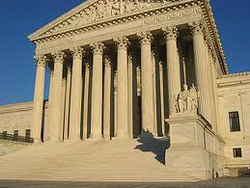By judgment of 21 June 2012, the US Supreme Court has validated the cancellation by the judge of sanctions pronounced by the Federal Communications Commission against chains of television for obscenities.
http://www.thejournalofregulation.com/spip.php?article1514

In the United States, the Federal Communications Commission had sanctioned for "indecency" two non-cabled television channels ABC and Fox, to have shown a woman entering back in the shower and let a singer say a rude word in a live broadcast. On appeal, the sanction was set aside by the federal judge. The regulator applies to the Supreme Court of the United States, which declared the case admissible and proceeds with the case, in a judgment of June 21, 2012. It dismisses the appeal of the regulator.It considers indeed that the regulator cannot punish channels in application of too-vague criteria of "indecency", as chains should know to what they expose themselves to the point where they act; otherwise punishment is contrary to the Constitution. This is a transposition of the legality of offences and penalties. The Court prefers to put the analysis on this field, repressive, and not the addressed by it, of the freedom of expression.
© thejournalofregulation
In the United States, the Federal Communications Commission had sanctioned two non-cabled television channels, ABC and FOX, for programs in which the viewer could see bare buttocks, a woman entering the shower back on an episode of NYPD Blues, and in which people used coarse words, the singer Cher who used a coarse word in the live presentation of the Awards.
Sanctioned channels seized the Federal Court, which quashed the decision of the regulator. It, in turn, made an appeal to the Supreme Court of the United States, which declared admissible the action. By a judgment of 21 June 2012, adopted unanimously by the 8 members present (the Court is composed of nine members), the Supreme Court rejected the appeal by the Federal Communications Commission.
The judges believe first that the regulator warned not enough television channels that the content they broadcast could be considered "indecent" and contrary to regulations, exposing them to the sanction.
For this, the judges emphasized that criteria of the regulator were "vague" and it is therefore contrary to the Constitution of punishing a person (here a corporation) that has not been advised that its behaviour would be regarded as unlawful.
By that judgment already very important, the Supreme Court recalled the applicability in regulation of the principle of the legality of offences and penalties: we cannot sanction on "vague" criteria. However, the "standards" of regulators are quite often "vague". This restoring on the path of repressive law is a strong protection.
We know that in the United States, liberalism and criminal law have always been compatible with especially for very power constitutional joint protection of the principle of the legality of offences and penalties, in regulatory matters.
The Court insists on the fact that the two shows in question were live (how can channels television control the guests?) and this quasi-criminal liability can be a problem. Finally, it doesn’t approaching matters explicitly address like the principle of freedom of expression, but on the one hand, indeed unopened, and under the law, it is little affected by two behaviour complained.
The case was not pure, because the penalty were not, for example, for an ideological statement considered as intolerable for example.
Indeed, judges of the Supreme Court, which are not disconnected from social life, pointed out that they were bashing the regulator for facts after all quite trivial, while it has not raised eyebrows to the diffusion of films very violent (decency is not concerned...), but profanity, as Saving private Ryan. Judges often expressed scepticism to a regulator who admits that some of the partie of the body are widely disclosed and others not. In short, the judges have shown that the Regulator, doing work of censor, expressed here, not without naivety, his own conception of morality and decency, in an almost childlike way. To the extent that the Federal Communications commission also saw the fine of $ 550,000 imposed on CBS quashed by the Court of Appeal Federal of Philadelphia, and the regulator also seized the Supreme Court, a hearing could be held in the fall of 2012, if the case is judged acceptable. This time, the unveiling of the Janet Jackson breast would swing from prosperity.

your comment